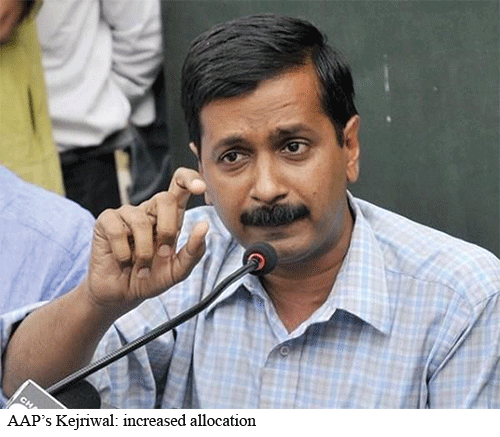 Following its stunning triumph in the Delhi state election of February 2015 when it won an astonishing 67 of the 70 seats in the legislative assembly, the Aam Aadmi Party (AAP) has its sights on the Punjab and Goa elections scheduled for early 2017. Unusually in the Indian political context, AAP is projecting its education achievements in Delhi to impress voters in these states. Rattled by the possibility of education becoming a major political issue, opposition parties are attacking the AAP ‘propaganda’ on education.
Following its stunning triumph in the Delhi state election of February 2015 when it won an astonishing 67 of the 70 seats in the legislative assembly, the Aam Aadmi Party (AAP) has its sights on the Punjab and Goa elections scheduled for early 2017. Unusually in the Indian political context, AAP is projecting its education achievements in Delhi to impress voters in these states. Rattled by the possibility of education becoming a major political issue, opposition parties are attacking the AAP ‘propaganda’ on education.
The first salvo was fired by the Congress party which has been in power at the Centre and in most states for over four decades since India’s independence and is primarily responsible for the low priority accorded to education by the State for the past 68 years. Writing in the Indian Express (August 22), Ajay Maken, president of the Delhi Pradesh Congress Committee, rubbished the tall claims being made by AAP spokespersons about transforming school education in Delhi. “Ever since chief minister Arvind Kejriwal doubled the budgetary allocation for education, there is a widespread perception that the education sector is being transformed. The basis of this perception is unclear. Is it the multiple full-page advertisements by the Delhi government publicising routine events like parent-teacher meetings or the glowing news reports on summer camps, held in a fraction of Delhi government schools, with mixed success?” he wrote.
According to Maken, “while important issues such as failure to fill teacher vacancies — risen to over 12,000 — have been ignored,” CCTV cameras installed in classrooms have created “the perception of an antagonistic relationship between teachers and students”.
However, there’s no denying that soon after being swept to power early last year, the AAP government of Delhi increased the allocation for education by 106 percent in the state government’s Budget 2015-16. And in Budget 2016-17, it provided Rs.10,690 crore (22.9 percent of the total plan outlay) for education.
But more vote-catching legislation to reduce tuition fees levied by private schools in Delhi state — the Delhi School (Verification of Accounts and Refund of Excess Fee) Bill, 2015 and proposal to delete s.10 (1) of the Delhi School Education (DSE) Act, 1973 to eliminate the right to pay parity (with government school teachers) of private school teachers — were returned by the state’s lieutenant governor. Under the peculiar arrangement in Delhi which is simultaneously governed by the Centre and the state, all Bills enacted by the state legislative assembly need to be approved by the lieutenant governor who represents the Central government.
Anurag Kundru, a member of the education task force of the Delhi state government, says “that during the two years that AAP has been in office in Delhi state, it has paid great attention to improving administration and teaching-learning standards in state government schools”. According to him, local school management committees (SMCs) comprising parents and educationists — stipulated by s.28 of the RTE Act, 2009 — have been established in all 1,011 government schools in the state and recently a summer camp for more than 45,000 students was organised with the help of SMCs.
However, the AAP government’s and particularly chief minister Arvind Kejriwal’s obstinate confrontation with the Narendra Modi-led Central government, which also governs Delhi, hasn’t helped the cause of education. “AAP started well in terms of monitoring government schools, reining in private schools from charging exorbitant fees and involving stakeholders including parents and the local community. But its larger initiatives haven’t reached anywhere and the desired impact is still missing,” says Ramesh Pranesh of SARTHAK, a Delhi-based education NGO.
Clearly, the AAP government’s unremittingly antagonistic confrontationism has stymied many of its school education reform proposals. This is just as well because some of them — reducing private school tuition fees, interference with teachers pay — are obviously ill-considered and potentially damaging to the public interest. But the silver-lining is that education is finally emerging as an election issue.
Autar Nehru (Delhi)



























